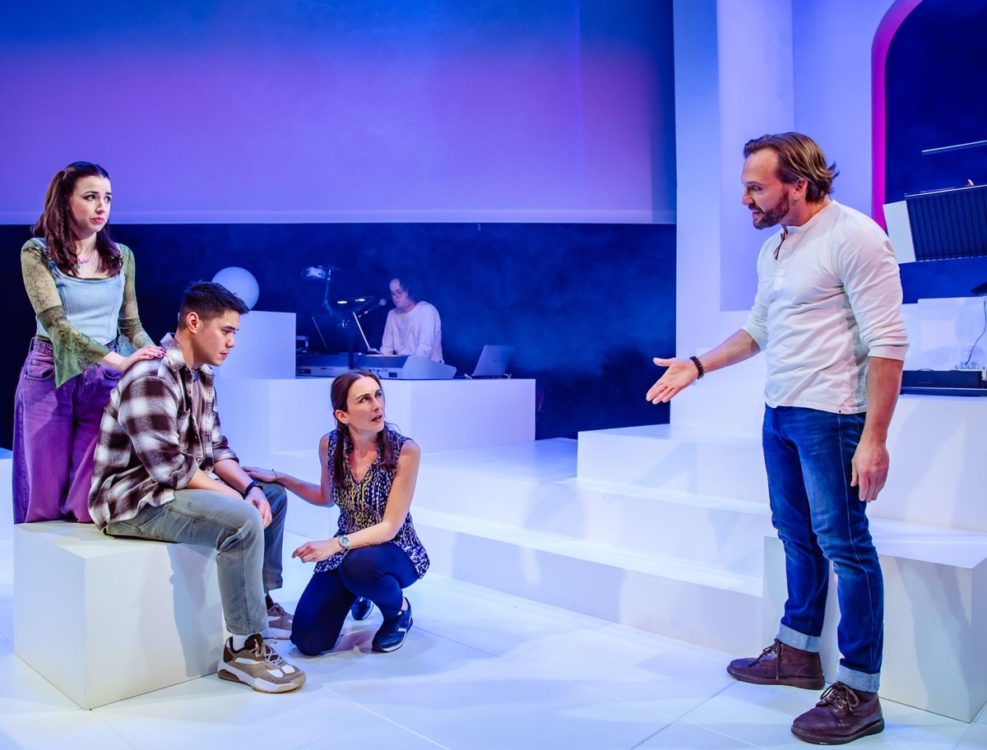Those of us who love musicals have eagerly been awaiting new ones, so I was so looking forward to watching ‘Killing the Cat’. It starts simply enough with a familiar ‘Mama Mia’ type plot-line where the main character, jaded writer Maggie Carter, goes to Italy for a holiday and falls for a hunky farmer she finds selling his wares in the local market. Nothing special about that, but she is a neuroscientist who sees the ‘soul’ as the product of chemical and electrical impulses in the brain, while he is ‘religious’ in an unspecified way and even runs an ‘enlightenment’ group after following an online programme of spiritual questioning.
The action takes place against a simple black and white set with arches and steps reflecting the opposing stances of the two main characters. The theme boils down to an argument about science versus religion between them. Can two people in love overcome their different ways of thinking to make a life together? Though curiosity killed the cat, nobody seems very curious or clever in this play, simply dogmatic. Underwhelming questions are asked – What is the reality outside ourselves? Imagine infinity! Why do we have mystical experiences? They don’t ask about any clever stuff like the nature of evil, the character of God or the question of freewill, but this is maybe expecting too much in a musical. Maggie finds Luke sexually attractive, as we are repeatedly told. But why not just have sex with him? It doesn’t involve sacrificing your professional world view. However, in order to stay with him she pretends to know nothing and goes along with his glib certainties about the ineffable.
The sub-plot uses two younger characters Heather who channels eighteenth century poets and her practical companion, Connor. The traditional function of these two would be to provide comic relief when the action of the principals gets too serious but here there simply aren’t enough laughs from their lines and they appear as a pale reflection of the leading characters. Connor’s song about ‘the existential angst’ he is experiencing from all this questioning was one of the highlights of the evening.
There are several problems that made this a less than uplifting evening. Mainly, there wasn’t enough conflict or tension. This was caused by the unequal weight the script gave the two main characters repeatedly arguing their opposing stances. Maggie is a world leader in her field who has written a best-selling science book. Luke is an affable farmer whose grasp of theology is slight, to say the least. There is a serious debate between the physical and the metaphysical which can (and often does) take place between informed people, but don’t come here for a stage representation of it. The second act drags and there seems to be little resolution except to give the relationship a try. Also, somewhat annoyingly, we never find out what happened to Luke ‘on the way to Hackney’ which turned him to God.
Despite the huge input and energy from the cast, it simply did not work for me. The five actors gave it their all, with strong performances and terrific singing voices, particularly the amazing Madalena Alberto. But however much you admire their gutsy efforts, you cannot escape the fact that the plot was all rather trite, the lyrics clunky (and rather old-fashioned for a modern play – ‘I want her for my own’ – really?) and the music rather samey throughout. It could have been one long song for the lack of variation. Nonetheless, it was good to see three accomplished young musicians playing cello, keyboard and percussion in the background.

